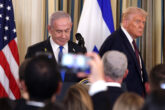December 09, 2024
Washington Needs a New Syria Policy Right Now
By the time you read this, the Syrian civil war might be over. The 13-year conflict, stuck in a bloody stalemate for the last three years, caught fire last week. What began as a small offensive push by opposition force Hayat Tahrir al-Sham (HTS) became a rout as the regime’s remaining forces collapsed and ended with the opposition marching through Damascus and Bashar al-Assad fleeing the country his family brutally ruled for more than five decades.
National security officials in the United States came to work Monday morning in need of a new strategy and policy for Syria. Even before this historic breakthrough, one was long overdue. Since the onset of Syria’s civil war in 2011, and over the course of three U.S. presidential administrations, U.S. policy on Syria has been seriously flawed.
It is well past time for Washington to demonstrate leadership, advance its global and regional interests, and support the freedom and future of the Syrian people.
Every choice was risky, producing decision paralysis that remained in evidence as recently as last week. When HTS’s offensive began, the U.S. State Department issued a flaccid joint statement with Britain, France, and Germany calling for de-escalation and urging the parties to pursue a negotiated settlement, as outlined in a 9-year-old U.N. Security Council resolution that was as meaningless to the warring parties today as it was the day it passed.
Now with the regime finally toppled by force, which was the only way Assad was ever going to be compelled to leave, the Biden administration, in coordination with the Trump transition team, has no choice but to try to find a new way forward.
Read the full article on Foreign Policy.
More from CNAS
-
Transatlantic Security / Middle East Security
The Russia-Iran Partnership: A Geopolitical Balancing ActIt has been almost a year since Russia and Iran signed their comprehensive strategic partnership. That deal established a 20-year partnership between the two countries coverin...
By Andrea Kendall-Taylor & Jim Townsend
-
Transatlantic Security / Middle East Security / Energy, Economics & Security
Sanctions Aren’t Enough to Shut Down the Moscow-Tehran Black Market for WarThe geographic scope and extent of Iranian-Russian cooperation highlights the failure of traditional sanctions to prevent Moscow and Tehran from seeking key components like ch...
By Delaney Soliday
-
How a Peace Deal Between Hamas and Israel Will Reshape the Middle East
Rachel Brandenberg joins NPR to discuss how the region will change if Israel and Hamas continue to abide by the peace deal President Trump brokered. Listen to the interview o...
By Rachel Brandenburg
-
Donald Trump’s Gaza Plan Skips Step One
The White House proposal attempts to solve too many distinct issues all at once, without enough input from Palestinians....
By Delaney Soliday




